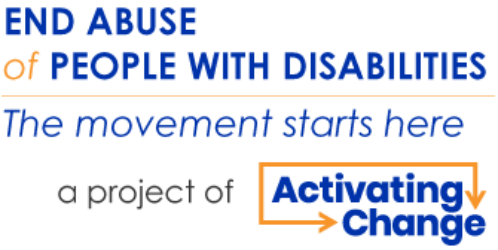Heightened Risk
Why Do People with Disabilities Experience Violence at Higher Rates?
Ableism, Racism and Other Forms of Oppression
Albleism, racism and other forms of oppression deem people more or less worthy of value based on their body, race, gender and other elements of identity. These forms of oppression have shaped society’s negative attitudes toward and treatment of people with disabilities, resulting in a cascading set of inequities in the lives of people with disabilities that create unsafe environments in which people with disabilities are targeted for violence with relative impunity.
Isolation
People with disabilities are often segregated and isolated in communities. While there have been policy and practice shifts away from putting people with disabilities in institutions and towards community-based care, many people with disabilities still live in institutions or nursing homes, which can be just as isolating. Even people with disabilities living in the community experience isolation, as social segregation between people with disabilities and those without persists. Isolation leads to invisibility and violence thrives behind closed doors.
Culture of Compliance
Many people with disabilities, especially people who have an intellectual or cognitive disability, are taught and expected to follow the directions of those “in charge” and comply with someone else’s wants, needs, or demands. There’s a belief that if a person with a disability just does what he’s told, he’ll be safe and get along okay in life. This is a dangerous belief and practice because anyone who’s taught and expected to automatically do what she’s told is more vulnerable and at risk of abuse. Abusers of people with disabilities rely on compliance. Expecting people with disabilities to be compliant “to those in charge” sets them up to be “perfect” targets for abusers to hurt and harm them.
Disregard for People with Disabilities’ Credibility
Persistent myths about people with disabilities as being unreliable witnesses has lead many to disregard their credibility when they report victimization. The result is that survivors are often silenced, ignored or dismissed. Abusers know this myth exists and they use it to their advantage: “No one will believe you, even if you do tell.”
Targeted with Impunity
Sexual assault and physical abuse is motivated by wanting to exert power and control over another person. Someone who is devalued, taught to be compliant, and seen as less credible by others is easier to have power over and easier to control. It is for this very reason that people with disabilities are often targeted for violence as abusers believe they can likely get away with it.
A Hidden Problem
Few people in general want to talk about or report when they have been raped or physically abused. The stigma that surrounds these types of interpersonal violence breeds silence. Add to that silence the myths, expectations of compliance, and devalued views held about people with disabilities. The result? People with disabilities who are abused are doubly silenced – who they are and the hurt and harm they experience is not widely known, understood, or taken seriously.
